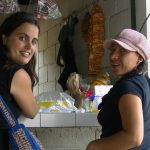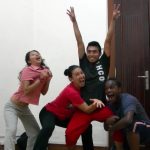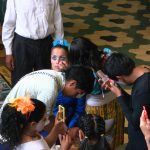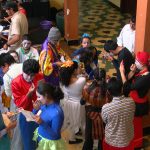Theatermaakster Anouk de Bruijn (32) is sinds 1999 zeven keer in Guatemala geweest. Voor de Vrede van Utrecht is zij een uitwisselingsproject aangegaan met de Guatemalteekse groep Caja Lúdica. Samen zetten ze zich ervoor in om via de kunst mensen een positieve belevenis te geven. Hun project ‘Verborgen oorlog’ gaat over het leven van jongeren in Guatemala.
Openheid, positiviteit en creativiteit lijken in een theaterproductie vrij normale uitgangspunten. Maar als je in Guatemala woont of bent geweest, leer je wel flink relativeren. Daar is door de burgeroorlog maar ook door de huidige politieke situatie zoveel wantrouwen, geweld en angst, dat een dergelijke basis compleet nieuw is voor veel jongeren.
‘Verborgen oorlog’ wordt een voorstelling op basis van persoonlijke verhalen van vier jongeren uit Guatemala en vier uit Utrecht. De vier jongeren uit Utrecht zijn in Guatemala geweest voor hun stage, scriptie of vrijwilligerswerk. Zij wisselen ervaringen uit over hun levens en hun land met vier jongeren uit Guatemala.
De titel slaat op de situatie in het Latijns-Amerikaanse land. Na het einde van de burgeroorlog in 1996 is het nu een democratie. Anouk de Bruijn vertelt:
Maar dat is alleen een woord. Er is veel geweld en onderdrukking. De voorstelling gaat ook in op de verborgen oorlog in jezelf. Het zoeken naar betekenis in je leven. Waarom ga je naar een land als Guatemala? Je loopt er altijd met risico en angst over straat.
Vogelvrij
Dat vroeg ze zich vooral tijdens de stage af die ze 2005 in Guatemala Stad liep:
Ik vond het zó heftig. Je bent je daar zo bewust van de dood. Je bent heel kwetsbaar. Er heerst daar enorme straffeloosheid en je bent dus vogelvrij. Slechts 2 procent van de daders wordt gepakt.
Van de groep Caja Lúdica zijn de afgelopen drie jaar vijf mensen vermoord. Dat geweld in combinatie met honger en armoede, dat voel je de hele tijd. Je kunt er na zes uur niet meer de straat op. Het is constante onveiligheid die je voelt.
Ze herinnert zich nog maar al te goed hoe ze vanuit een taxi zag dat twee mannen een andere man in elkaar trapten.
Maar telkens als ik er komt, voel ik me er toch erg thuis. Het is een mooi land en ik vind het fijn hoe de mensen met elkaar omgaan. Dat past bij mij.
Conflictsituaties
De tweede keer dat ze er kwam, zag ze een ‘comparsa’, een soort optocht met veel muziek, dans en kostuums, van Caja Lúdica. Ze was ervan onder de indruk, zocht contact met de groep en die ontmoeting was voor haar de reden om de opleiding docent drama te gaan doen in Utrecht. De theatermaakster legt uit:
Caja Lúdica werkt volgens een methodiek die uit Colombia komt. Die is gericht op conflictsituaties. Hoe kun je in een land dat in oorlog is via kunst een alternatief bieden voor geweld en wantrouwen? Zij zorgen ervoor dat mensen plezier beleven en weer vertrouwen in zichzelf en de omgeving krijgen. Ze maken de jongeren met wie ze werken bewust van de situatie waarin zij opgroeien en hoe ze daar iets aan kunnen veranderen.
Van Colombia is deze vorm van ‘social theatre’ naar Guatemala gegaan. Jongeren volgen daar opleidingen en geven vervolgens zelf workshops in hun eigen wijken. De bedoeling is dat het zich zo verspreidt en er een netwerk in de wijk ontstaat. Voor mij was het de aanleiding om theater docent te worden. Ik wilde werken met mensen die niet snel in contact komen met theater en toneel in een sociale context zetten.
Anouk de Bruijn heeft dat in Nederland gedaan met een project in Cuijk, waar ze is geboren. Daarvoor interviewde ze wijkbewoners en op basis van die gesprekken heeft ze een voorstelling gemaakt, waarin de bewoners zelf speelden. Datzelfde doet ze nu met het uitwisselingsproject met Guatemala.
Vertrouwen
Caja Lúdica kent ze inmiddels goed. Ze bewondert het gezelschap, omdat jongeren er echt groeien en iets positiefs beleven.
Die jongeren, soms nog maar 16 jaar oud, staan met zoveel vertrouwen en plezier en zó sterk op scholen workshops te geven. Jongeren worden echt een deel van Caja Lúdica en alles komt vanuit henzelf komt. Dat moet ook, want er is geen subsidie. Alles is eigen initiatief.
Openheid
De uitwisseling voor ’Verborgen oorlog’ gebeurt op diverse lagen. Ten eerste in de werkwijze.
Ik leer van Caja Lúdica hoe zij jongeren aan zich binden. Ze werken heel beeldend en collectief. Ik maak juist meer kleine, persoonlijke portretten. Het is heel interessant om daarin van elkaar te leren.
Het is ook een uitwisseling in verhalen. Hoe is het om daar op te groeien? En hoe is het om hier te leven?
Wat me heel erg heeft geraakt, is de openheid waarmee ze met mij hebben gesproken over alles wat ze hebben meegemaakt en de kracht waarmee ze werken.
Narcos
Om de jongeren te begrijpen, bezocht ze wijken waar ze zijn opgegroeid.
We gingen naar het huis van een meisje. Op een gegeven moment zei zij: ’Nu moet de camera weg. Dit is het deel van de narcos en hier zijn elke dag schietpartijen.’ Zij groeien daarin op.
Dat meisje komt in mei naar Nederland en staat in de voorstelling ‘Verborgen Oorlog’, die tijdens het festival De Vrede van Utrecht op 20 en 21 juni 2013 is te zien.
Vervolg
Voor het zover is, moet er nog veel gebeuren. Anouk de Bruijn verwerkt nu alle interviews en is het stuk aan het schrijven. Ze werkt daarvoor samen met mensen van stichting De Rest, die haar klankbord zijn en de dramaturgie doen.
Catalina, de co-regisseur van Caja Lúdica, komt in oktober naar Nederland. Samen zullen ze een locatie zoeken waar ze de voorstelling willen spelen. Ook werken ze verder aan het concept.
In februari keert Anouk de Bruijn terug naar Guatemala Stad om te werken met de Guatemalteken. In mei komen de vier spelers met Catalina naar Nederlanden kunnen zij met hun Nederlandse collega’s werken aan het eindresultaat. En hoe dat eruit ziet, weet Anouk de Bruijn nu zelf ook nog niet.






Reacties zijn gesloten.